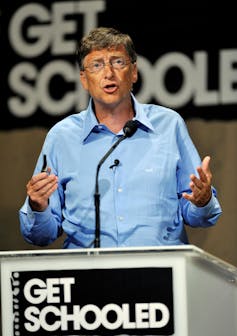Why big bets on educational reform haven’t fixed the US school system
The Gates Foundation is regrouping after its latest school improvement disappointment, but it’s not bowing out of the education reform business.
As the philanthropic powerhouse led by Bill and Melinda Gates explained in their latest annual letter to the public, it ended its effort to overhaul teacher evaluation systems after determining that these efforts were failing to generate intended results.
“We haven’t seen the large impact we had hoped for,” the Microsoft founder and his wife wrote in the note they published in February.

It’s a familiar storyline. Again and again, policymakers and philanthropists have teamed up to reform public education, only to find that their bold projects have fallen short.
Like other educational policy scholars, we have observedthis pattern for years. And we have identified a few reasons why school reform efforts so persistently get lackluster results, despite consistent bipartisan support and roughly US$4 billion a year in philanthropic funding derived from some of the nation’s biggest fortunes.
Shiny objectives
The Gates Foundation (which is a strategic partner of The Conversation US and provides funding for The Conversation internationally) poured at least $700 millioninto upgrading teacher evaluation systems between 2008 and 2013, before quietly pulling the plug. The move echoed a similar about-face that occurred decade ago, when the funder acknowledged that the $2 billion it had spent on making America’s large high schools smaller hadn’t achieved the desired results.
But Gates is hardly the only major philanthropist to come up short. Facebook founder Mark Zuckerberg and his wife Priscilla Chan spent $100 million of their own money to improve the Newark school system, in an effort that attracted another $100 million from other donors. Their goal in New Jersey, according to journalist Dale Russakoff, was to “develop a model for saving public education in all of urban America.” The results, chronicled in Russakoff’s 2016 book “The Prize,” were mixed at best. Though some education scholars have detected improvements in Newark, and test scores have edged up since the experiment, it generally failed to meet the funders’ lofty goals.
Leaders in government have also been active in the school reform game.
Ever since 1983, when the Reagan administration published its “A Nation at Risk” report bemoaning the quality of American public education, politicians have rallied public support for plans to overhaul the nation’s education system. Over the past quarter century, they have backed the creation of curricular standards and high-stakes standardized tests. And they have championed privately operated charter schools as a replacement for traditional public schools, along with vouchers and other subsidies to defray the cost of private school tuition.
Along the way, reformers – those in government and the philanthropic world alike – have Why big bets on educational reform haven't fixed the US school system:


